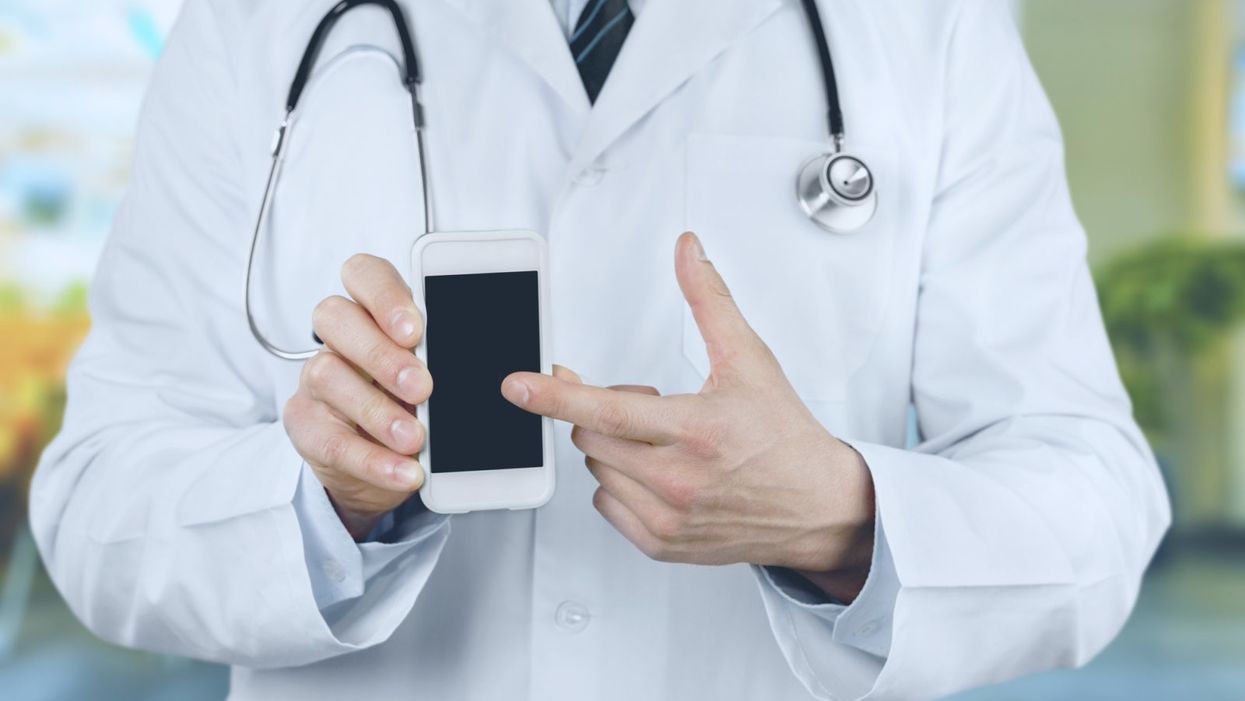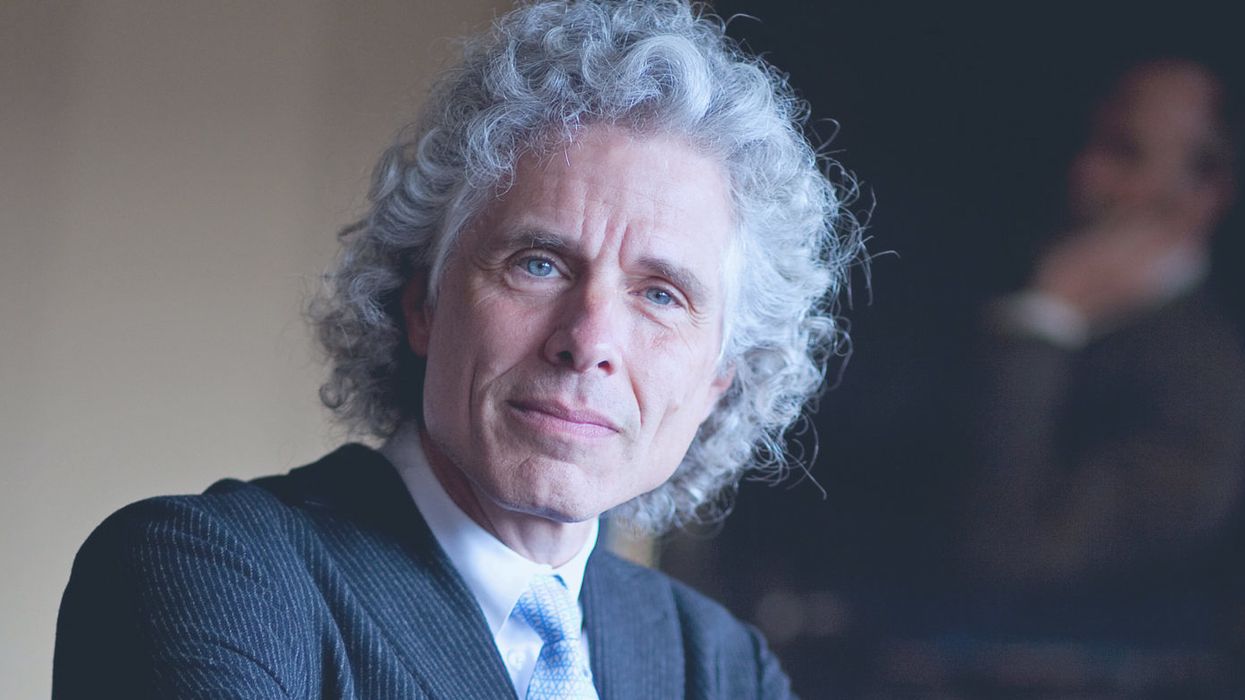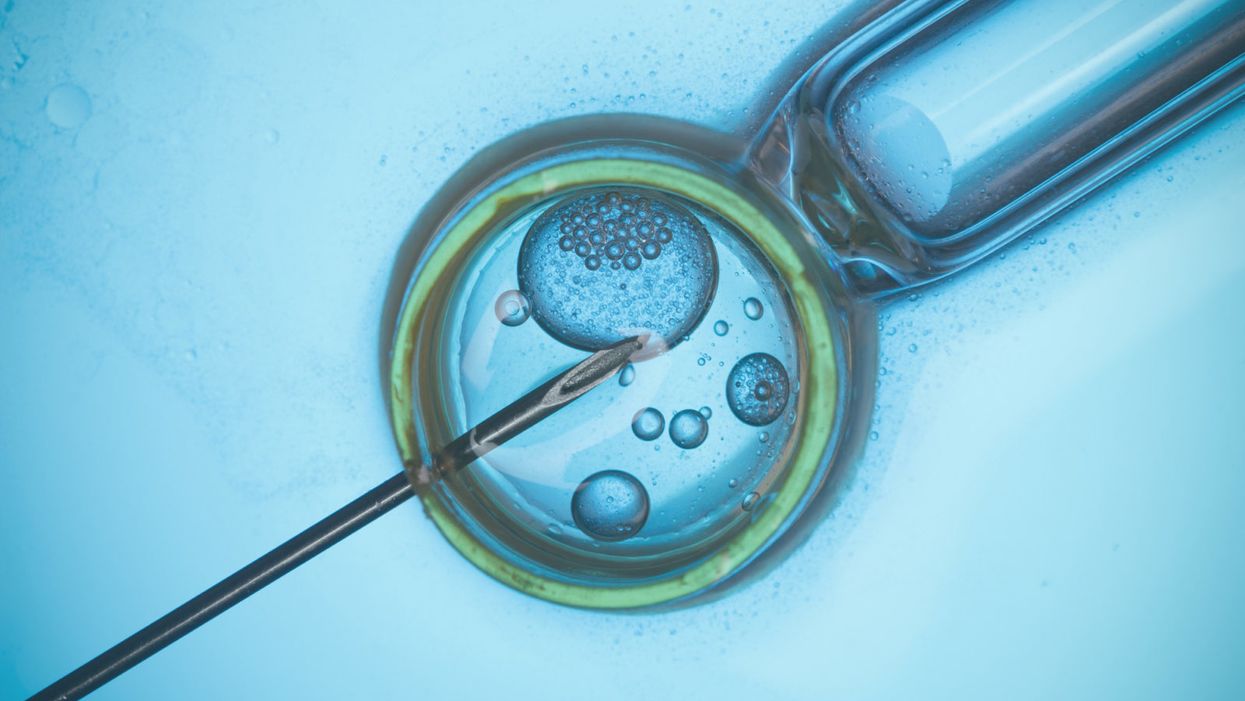A close up of a doctor pointing at a smart phone, heralding the new era of prescription digital therapeutics.
You may be familiar with Moore's Law, the prediction made by Intel co-founder Gordon Moore that computer chips would get faster and cheaper with each passing year. That's been borne out by the explosive growth of the tech industry, but you may not know that there is an inverse Moore's Law for drug development.
What if there were a way to apply the fast-moving, low-cost techniques of software development to drug discovery?
Eroom's Law—yes that's "Moore" spelled backward—is the observation that drug discovery has become slower and more expensive over time, despite technological improvements. And just like Moore's Law, it's been borne out by experience—from the 1950s to today, the number of drugs that can be developed per billion dollars in spending has steadily decreased, contributing to the continued growth of health care costs.
But what if there were a way to apply the fast-moving, low-cost techniques of software development to drug discovery? That's what a group of startups in the new field of digital therapeutics are promising. They develop apps that are used—either on their own or in conjunction with conventional drugs—to treat chronic disorders like addiction, diabetes and mental health that have so far resisted a pharmaceutical approach. Unlike the thousands of wellness and health apps that can be downloaded to your phone, digital therapeutics are developed and are meant to be used like drugs, complete with clinical trials, FDA approval and doctor prescriptions.
The field is hot—in 2017 global investment in digital therapeutics jumped to $11.5 billion, a fivefold increase from 2012, and major pharma companies like Novartis are developing their own digital products or partnering with startups. One such startup is the bicoastal Pear Therapeutics. Last month, Pear's reSET-O product became the first digital therapeutic to be approved for use by the millions of Americans who struggle with opioid use disorder, and the company has other products addressing addiction and mental illness in the pipeline.
I spoke with Dr. Corey McCann, Pear's CEO, about the company's efforts to meld software and medicine, designing clinical trials for an entirely new kind of treatment, and the future of digital therapeutics.
The interview has been edited and condensed for clarity and length.
"We're looking at conditions that currently can't be cured with drugs."
BRYAN WALSH: What makes a digital therapeutic different than a wellness app?
COREY MCCANN: What we do is develop therapeutics that are designed to be used under the auspices of a physician, just as a drug developed under good manufacturing would be. We do clinical studies for both safety and efficacy, and then they go through the development process you'd expect for a drug. We look at the commercial side, at the role of doctors. Everything we do is what would be done with a traditional medical product. It's a piece of software developed like a drug.
WALSH: What kind of conditions are you first aiming to treat with digital therapeutics?
MCCANN: We're looking at conditions that currently can't be cured with drugs. A good example is our reSET product, which is designed to treat addiction to alcohol, cannabis, stimulants, cocaine. There really aren't pharmaceutical products that are approved to treat people addicted to these substances. What we're doing is functional therapy, the standard of care for addiction treatment, but delivered via software. But we can also work with medication—our reSET-O product is a great example. It's for patients struggling with opioid addiction, and it's delivered in concert with the drug buprenorphine.
WALSH: Walk me through what the patient experience would be like for someone on a digital therapeutic like reSET.
MCCANN: Imagine you're a patient who has been diagnosed with cocaine addiction by a doctor. You would then receive a prescription for reSET during the same office visit. Instead of a pharmacy, the script is sent to the reSET Connect Patient Service Center, where you are onboarded and given an access code that is used to unlock the product after downloading it onto your device. The product has 60 different modules—each one requiring about a 10 to 15-minute interaction—all derived from a form of cognitive behavioral therapy called community reinforcement approach. The treatment takes place over 90 days.
"The patients receiving the digital therapeutic were more than twice as likely to remain abstinent as those receiving standard care."
Patients report their substance abuse, cravings and triggers, and they are also tested on core proficiencies through the therapy. Physicians have access to all of their data, which helps facilitate their one-on-one meetings. We know from regular urine tests how effective the treatment is.
WALSH: What kind of data did you find when you did clinical studies on reSET?
MCCANN: We had 399 patients in 10 centers taking part in a randomized clinical trial run by the National Institute on Drug Abuse. Every patient enrolled in the study had an active substance abuse disorder. The study was randomized so that patients either received the best current standard of care, which is three hours a week of face-to-face therapy, or they received the digital therapeutic. The primary endpoint was abstinence in weeks 9 to 12—if the patient had a single dirty urine screen in the last month, they counted as a failure.
In the end, the patients receiving the digital therapeutic were more than twice as likely to remain abstinent as those receiving standard care—40 percent versus 17 percent. Those receiving reSET were also much more likely to remain in treatment through the entire trial.
WALSH: Why start by focusing your first digital therapeutics on addiction?
MCCANN: We have tried to build a company that is poised to make a difference in medicine. If you look at addiction, there is little to nothing in the drug pipeline to address this. More than 30 million people in the U.S. suffer from addiction disorders, and not only is efficacy a concern, but so is access. Many patients aren't able to receive anything like the kind of face-to-face therapy our control group received. So we think digital therapeutics can make a difference there as well.
WALSH: reSET was the first digital therapeutic approved by the FDA to treat a specific disorder. What has the approval process been like?
MCCANN: It's been a learning process for all involved, including the FDA. Our philosophy is to work within the clinical trials structure, which has specific disease targets and endpoints, and develop quality software, and bring those two strands together to generate digital therapeutics. We now have two products that have been FDA-approved, and four more in development. The FDA is appropriately cautious about all of this, balancing the tradeoff between patient risk and medical value. As we see it, our company is half tech and half biotech, and we follow regulatory trials that are as rigorous as they would be with any drug company.
"This is a new space, but when you look back in 10 years there will be an entire industry of prescription digital therapeutics."
WALSH: How do you balance those two halves, the tech side and the biology side? Tech companies are known for iterating rapidly and cheaply, while pharma companies develop drugs slowly and expensively.
MCCANN: This is a new space, but when you look back in 10 years there will be an entire industry of prescription digital therapeutics. Right now for us we're combining the rigor of the pharmaceutical model with the speed and agility of a tech company. Our product takes longer to develop than an unverified health app, but less time and with less clinical risk than a new molecular entity. This is still a work in progress and not a day goes by where we don't notice the difference between those disciplines.
WALSH: Who's going to pay for these treatments? Insurers are traditionally slow to accept new innovations in the therapeutic space.
MCCANN: This is just like any drug launch. We need to show medical quality and value, and we need to get clinician demand. We want to focus on demonstrating as many scripts as we can in 2019. And we know we'll need to be persistent—we live in a world where payers will say no to anything three times before they say yes. Demonstrating value is how you get there.
WALSH: Is part of that value the possibility that digital therapeutics could be much cheaper than paying someone for multiple face-to-face therapy sessions?
MCCANN: I believe the cost model is very compelling here, especially when you can treat diseases that were not treatable before. That is something that creates medical value. Then you have the data aspect, which makes our product fundamentally different from a drug. We know everything about every patient that uses our product. We know engagement, we can push patient self-reports to clinicians. We can measure efficiency out in the real world, not just in a measured clinical trial. That is the holy grail in the pharma world—to understand compliance in practice.
WALSH: What's the future of digital therapeutics?
MCCANN: In 10 years, what we think of as digital medicine will just be medicine. This is something that will absolutely become standard of care. We are working on education to help partners and payers figure out where go from here, and to incorporate digital therapeutics into standard care. It will start in 2019 and 2020 with addiction medicine, and then in three to five years you'll see treatments designed to address disorders of the brain. And then past the decade horizon you'll see plenty of products that aim at every facet of medicine.
Steven Pinker: Data Shows That Life Today Is Better Than Ever
Steven Pinker, a cognitive psychologist at Harvard, argues that the ideals of the Enlightenment deserve a vigorous moral defense.
The government shutdown. A volatile stock market. Climate change.
It's so easy to get discouraged by the latest headlines, argues Steven Pinker, that we lose sight of the bigger picture: life today is actually improving.
"To appreciate the world, we've got to look at numbers and trends."
Pinker, a cognitive psychologist from Harvard, says in his book "Enlightenment Now" that we're living at the greatest moment of progress in history, thanks to reason, science, and humanism. But today, he says, these ideals are under-appreciated, and we ignore them at our peril.
So he set out to provide a vigorous moral defense of the values of the Enlightenment by examining the evidence for their effectiveness. Across a range of categories from happiness and health to peace and safety, Pinker examines the data and reassures readers that this is a pretty great time to be alive. As we kick off the new year, he's hopeful that our embrace of science and reason will lead to an even more prosperous future. But political and cultural hurdles must still be overcome before the heroic story of human progress can continue to unfold.
Pinker spoke with our Editor-in-Chief Kira Peikoff in advance of the book's paperback release, which hits stores next Tuesday. This interview has been edited and condensed for clarity.
One anecdote you describe in the book was particularly striking: how the public reacted when the polio vaccine was announced. People took the day off work to celebrate, they smiled at each other in the streets, they offered to throw parades. Today, it's hard to imagine such prevalent enthusiasm for a new advance. How can we bring back a culture of respect and gratitude for science?
That's such a good question. And I wish I knew the answer. My contribution is just to remind people of how much progress we've made. It's easy to ignore if your view of the world comes from headlines, but there are some built-in biases in journalism that we have to counteract. Most things that happen all of a sudden are bad things: wars break out, terrorists attack, rampage shootings occur, whereas a lot of the things that make us better off creep up by stealth. But we have to become better aware of them.
It's unlikely that we're going to have replications of the great Salk event, which happened on a particular day, but I think we have to take lessons from cognitive science, from the work of people like Daniel Kahneman and Amos Tversky, showing how misled we can be by images and narratives and that to appreciate the world, we've got to look at numbers and trends.
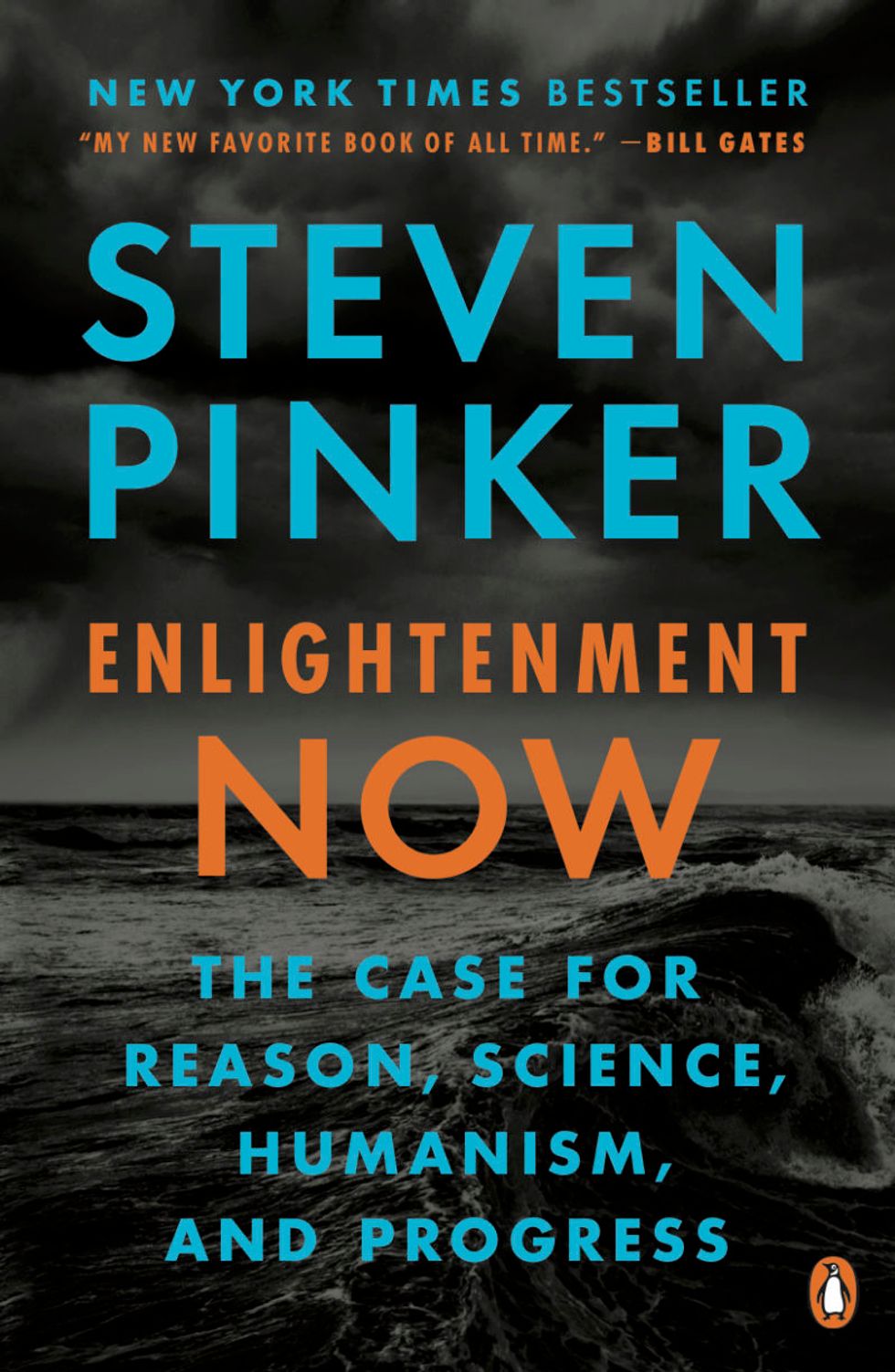
The cover of "Enlightenment Now," which comes out in paperback next week.
You mention that the President's Bioethics Council under Bush was appointed to deal with "the looming threat of biomedical advances." Do you think that professional bioethicists are more of a hindrance than a help when it comes to creating truly enlightened science policy?
I do. I think that there are some problems in the culture of bioethics. And of course, I would not argue against that the concept of bioethics. Obviously, we have to do biomedical research and applications conscientiously and ethically. But the field called Bioethics tends to specialize in exotic thought experiments that tend to imagine the worst possible things that can happen, and often mire research in red tape that results in a net decrease in human welfare, whereas the goal of bioethics should be to enhance human welfare.
In an op-ed that I published in the Boston Globe a few years ago, I said, deliberately provocatively, that the main moral imperative of bioethics is to get out of the way since there's so much suffering that humans endure from degenerative diseases, from cancer, from heart disease and stroke. The potential for increasing happiness and well-being from biomedical research is just stupendous. So before we start to drag out Brave New World for the umpteenth time, or compare every advance in genetics to the Nazis, we should remember the costs of people dying prematurely from postponing advances in biomedical research.
Later in the book, you mention how much more efficient the production of food has become due to high-tech agriculture. But so many people today are leery of advances in the food industry, like GMOs. And we will have to feed 10 billion people in 2050. Are you concerned about how we will meet that challenge?
Yes, I think anyone has to be, and all the more reason we should be clear about what is simultaneously best for humans and for the planet, which is to grow as much food on this planet as possible. That ideal of density -- the less farmland the better -- runs up against the ideal of the organic farming and natural farming, which use lots of land. So genetically modified organisms and precision agriculture of the kind that is sometimes associated with Israel -- putting every last drop of water to use, delivering it when it's needed, using the minimum amount of fertilizer -- all of these technologically driven developments are going to be necessary to meet that need.
"The potential for increasing happiness and well-being from biomedical research is just stupendous."
You also mention "sustainability" as this big buzz word that you say is based on a flawed assumption that we will run out of resources rather than pivot to ingenious alternatives. What's the most important thing we can do as a culture to encourage innovation?
It has to be an ideal. We have restore it as what we need to encourage, to glorify in order to meet the needs of humanity. Governments have to play a role because lots of innovation is just too risky with benefits that are too widely diffuse for private companies and individuals to pursue. International cooperation has to play a role. And also, we need to change our environmental philosophy from a reflexive rejection of technology to an acknowledgement that it will be technology that is our best hope for staving off environmental problems.
And yet innovation and technology today are so often viewed fearfully by the public -- just look at AI and gene editing. If we need science and technology to solve our biggest challenges, how do we overcome this disconnect?
Part of it is simply making the argument that is challenging the ideology and untested assumptions behind traditional Greenism. Also, on the part of the promoters of technology themselves, it's crucial to make it not just clear, but to make it a reality that technology is going to be deployed to enhance human welfare.
That of course means an acknowledgement of the possible harms and limitations of technology. The fact that the first widely used genetically modified crop was soybeans that were resistant to herbicides, to Roundup -- that was at the very least a public relations disaster for genetically modified organisms. As opposed to say, highlighting crops that require less insecticide, less chemical fertilizers, less water level. The poster children for technology should really be cases that quite obviously benefit humanity.
"One of the surprises from 'Enlightenment Now' was how much moral progress depends on economic progress."
Finally, what is one emerging innovation that you're excited about for 2019?
I would say 4th generation nuclear power. Small modular reactors. Because everything depends on energy. For poor countries to get rich, they are going to have to consume far more energy than they do now and if they do it via fossil fuels, especially coal, that could spell disaster. Zero-carbon energy will allow poor countries to get richer -- and rich countries to stay rich without catastrophic environmental damage.
One of the surprises from "Enlightenment Now" was how much moral progress depends on economic progress. Rich countries not only allow the citizens to have cool gadgets, but all kinds of good things happen when a country gets rich, like Norway, Netherlands, Switzerland. Countries that are richer on average are more democratic, are less likely that to fight wars, are more feminist, are more environmentally conscientious, are smarter -- that is, they have a greater increase in IQ. So anything that makes a country get richer, and that's going to include a bunch of energy, is going to make humanity better off.
Kira Peikoff was the editor-in-chief of Leaps.org from 2017 to 2021. As a journalist, her work has appeared in The New York Times, Newsweek, Nautilus, Popular Mechanics, The New York Academy of Sciences, and other outlets. She is also the author of four suspense novels that explore controversial issues arising from scientific innovation: Living Proof, No Time to Die, Die Again Tomorrow, and Mother Knows Best. Peikoff holds a B.A. in Journalism from New York University and an M.S. in Bioethics from Columbia University. She lives in New Jersey with her husband and two young sons. Follow her on Twitter @KiraPeikoff.
Top Fertility Doctor: Artificially Created Sperm and Eggs "Will Become Normal" One Day
A rendering of in vitro fertilization.
Imagine two men making a baby. Or two women. Or an infertile couple. Or an older woman whose eggs are no longer viable. None of these people could have a baby today without the help of an egg or sperm donor.
Cells scraped from the inside of your cheek could one day be manipulated to become either eggs or sperm.
But in the future, it may be possible for them to reproduce using only their own genetic material, thanks to an emerging technology called IVG, or in vitro gametogenesis.
Researchers are learning how to reprogram adult human cells like skin cells to become lab-created egg and sperm cells, which could then be joined to form an embryo. In other words, cells scraped from the inside of your cheek could one day be manipulated to become either eggs or sperm, no matter your gender or your reproductive fitness.
In 2016, Japanese scientists proved that the concept could be successfully carried out in mice. Now some experts, like Dr. John Zhang, the founder and CEO of New Hope Fertility Center in Manhattan, say it's just "a matter of time" before the method is also made to work in humans.
Such a technological tour de force would upend our most basic assumptions about human reproduction and biology. Combined with techniques like gene editing, these tools could eventually enable prospective parents to have an unprecedented level of choice and control over their children's origins. It's a wildly controversial notion, and an especially timely one now that a Chinese scientist has announced the birth of the first allegedly CRISPR-edited babies. (The claims remain unverified.)
Zhang himself is no stranger to controversy. In 2016, he stunned the world when he announced the birth of a baby conceived using the DNA of three people, a landmark procedure intended to prevent the baby from inheriting a devastating neurological disease. (Zhang went to a clinic in Mexico to carry out the procedure because it is prohibited in the U.S.) Zhang's other achievements to date include helping a 49-year-old woman have a baby using her own eggs and restoring a young woman's fertility through an ovarian tissue transplant surgery.
Zhang recently sat down with our Editor-in-Chief in his New York office overlooking Columbus Circle to discuss the fertility world's latest provocative developments. Here are his top ten insights:
Clearly [gene-editing embryos] will be beneficial to mankind, but it's a matter of how and when the work is done.
1) On a Chinese scientist's claim of creating the first CRISPR-edited babies:
I'm glad that we made a first move toward a clinical application of this technology for mankind. Somebody has to do this. Whether this was a good case or not, there is still time to find out.
Clearly it will be beneficial to mankind, but it's a matter of how and when the work is done. Like any scientific advance, it has to be done in a very responsible way.
Today's response is identical to when the world's first IVF baby was announced in 1978. The major news media didn't take it seriously and thought it was evil, wanted to keep a distance from IVF. Many countries even abandoned IVF, but today you see it is a normal practice. And it took almost 40 years [for the researchers] to win a Nobel Prize.
I think we need more time to understand how this work was done medically, ethically, and let the scientist have the opportunity to present how it was done and let a scientific journal publish the paper. Before these become available, I don't think we should start being upset, scared, or giving harsh criticism.
2) On the international outcry in response to the news:
I feel we are in scientific shock, with many thinking it came too fast, too soon. We all embrace modern technology, but when something really comes along, we fear it. In an old Chinese saying, one of the masters always dreamed of seeing the dragon, and when the dragon really came, he got scared.
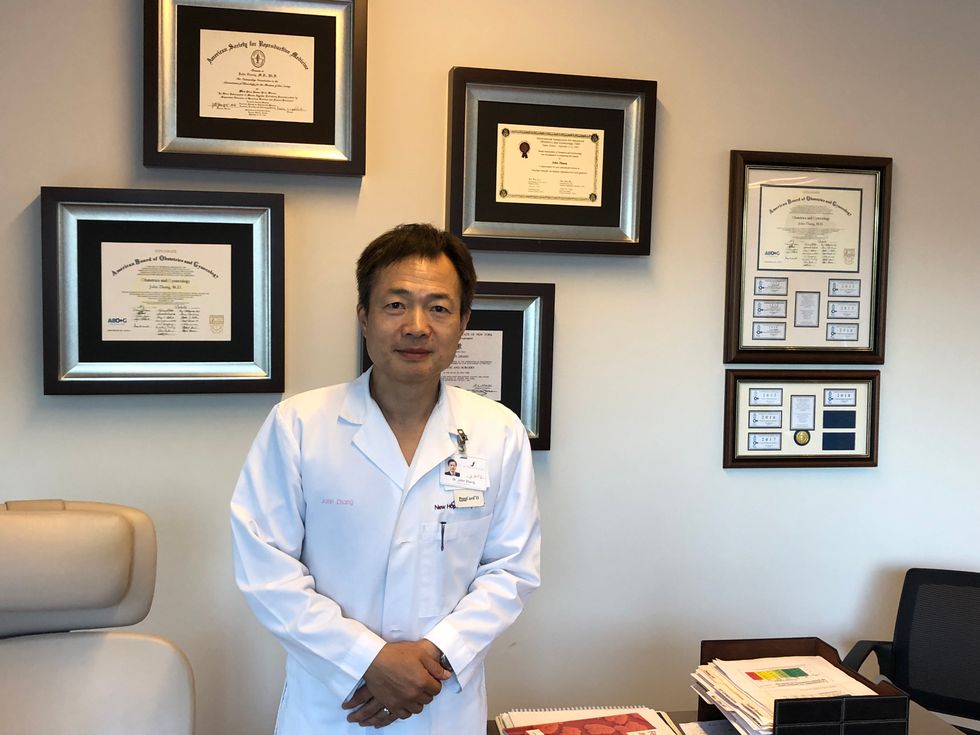
Dr. John Zhang, the founder and CEO of New Hope Fertility Center in Manhattan, pictured in his office.
3) On the Western world's perception that Chinese scientists sometimes appear to discount ethics in favor of speedy breakthroughs:
I think this perception is not fair. I don't think China is very casual. It's absolutely not what people think. I don't want people to feel that this case [of CRISPR-edited babies] will mean China has less standards over how human reproduction should be performed. Just because this happened, it doesn't mean in China you can do anything you want.
As far as the regulation of IVF clinics, China is probably the most strictly regulated of any country I know in this world.
4) On China's first public opinion poll gauging attitudes toward gene-edited babies, indicating that more than 60 percent of survey respondents supported using the technology to prevent inherited diseases, but not to enhance traits:
There is a sharp contrast between the general public and the professional world. Being a working health professional and an advocate of scientists working in this field, it is very important to be ethically responsible for what we are doing, but my own feeling is that from time to time we may not take into consideration what the patient needs.
5) On how the three-parent baby is doing today, several years after his birth:
No news is good news.
6) On the potentially game-changing research to develop artificial sperm and eggs:
First of all I think that anything that's technically possible, as long as you are not harmful to other people, to other societies, as long as you do it responsibly, and this is a legitimate desire, I think eventually it will become reality.
My research for now is really to try to overcome the very next obstacle in our field, which is how to let a lady age 44 or older have a baby with her own genetic material.
Practically 99 percent of women over age 43 will never make a baby on their own. And after age 47, we usually don't offer donor egg IVF anymore.
But with improved longevity, and quality of life, the lifespan of females continues to increase. In Japan, the average for females is about 89 years old. So for more than half of your life, you will not be able to produce a baby, which is quite significant in the animal kingdom. In most of the animal kingdom, their reproductive life is very much the same as their life, but then you can argue in the animal kingdom unlike a human being, it doesn't take such a long time for them to contribute to the society because once you know how to hunt and look for food, you're done.
"I think this will become a major ethical debate: whether we should let an older lady have a baby at a very late state of her life."
But humans are different. You need to go to college, get certain skills. It takes 20 years to really bring a human being up to become useful to society. That's why the mom and dad are not supposed to have the same reproductive life equal to their real life.
I think this will become a major ethical debate: whether we should let an older lady have a baby at a very late state of her life and leave the future generation in a very vulnerable situation in which they may lack warm caring, proper guidance, and proper education.
7) On using artificial gametes to grant more reproductive choices to gays and lesbians:
I think it is totally possible to have two sperm make a baby, and two eggs make babies.
If we have two guys, one guy to produce eggs, or two girls, one would have to become sperm. Basically you are creating artificial gametes or converting with gametes from sperm to become egg or egg to become a sperm. Which may not necessarily be very difficult. The key is to be able to do nuclear reprogramming.
So why can two sperm not make offspring now? You get exactly half of your genes from each parent. The genes have their own imprinting that say "made in mom," "made in dad." The two sperm would say "made in dad," "made in dad." If I can erase the "made in dad," and say "made in mom," then these sperm can make offspring.
8) On how close science is to creating artificial gametes for clinical use in pregnancies:
It's very hard to say until we accomplish it. It could be very quick. It could be it takes a long time. I don't want to speculate.
"I think these technologies are the solid foundation just like when we designed the computer -- we never thought a computer would become the iPhone."
9) On whether there should be ethical red lines drawn by authorities or whether the decisions should be left to patients and scientists:
I think we cannot believe a hundred percent in the scientist and the patient but it should not be 100 percent authority. It should be coming from the whole of society.
10) On his expectations for the future:
We are living in a very exciting world. I think that all these technologies can really change the way of mankind and also are not just for baby-making. The research, the experience, the mechanism we learn from these technologies, they will shine some great lights into our long-held dream of being a healthy population that is cancer-free and lives a long life, let's say 120 years.
I think these technologies are the solid foundation just like when we designed the computer -- we never thought a computer would become the iPhone. Imagine making a computer 30 years ago, that this little chip will change your life.
Kira Peikoff was the editor-in-chief of Leaps.org from 2017 to 2021. As a journalist, her work has appeared in The New York Times, Newsweek, Nautilus, Popular Mechanics, The New York Academy of Sciences, and other outlets. She is also the author of four suspense novels that explore controversial issues arising from scientific innovation: Living Proof, No Time to Die, Die Again Tomorrow, and Mother Knows Best. Peikoff holds a B.A. in Journalism from New York University and an M.S. in Bioethics from Columbia University. She lives in New Jersey with her husband and two young sons. Follow her on Twitter @KiraPeikoff.
